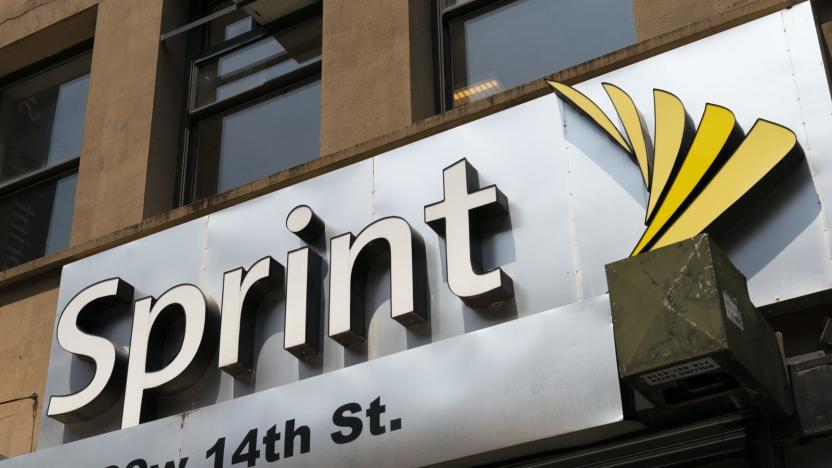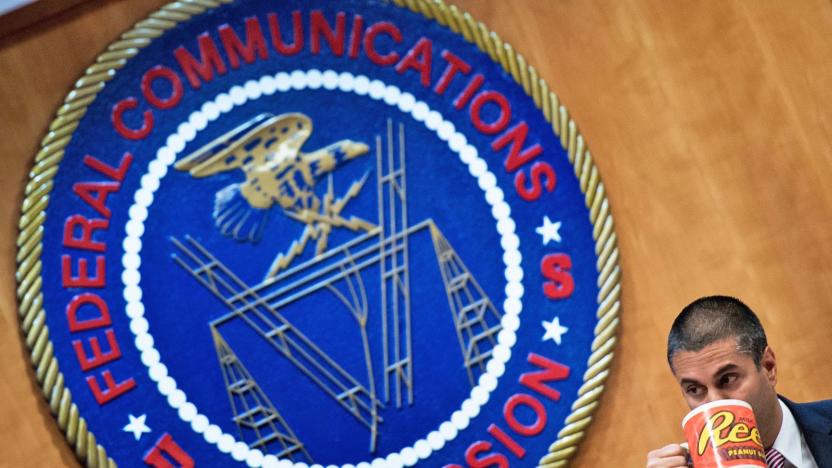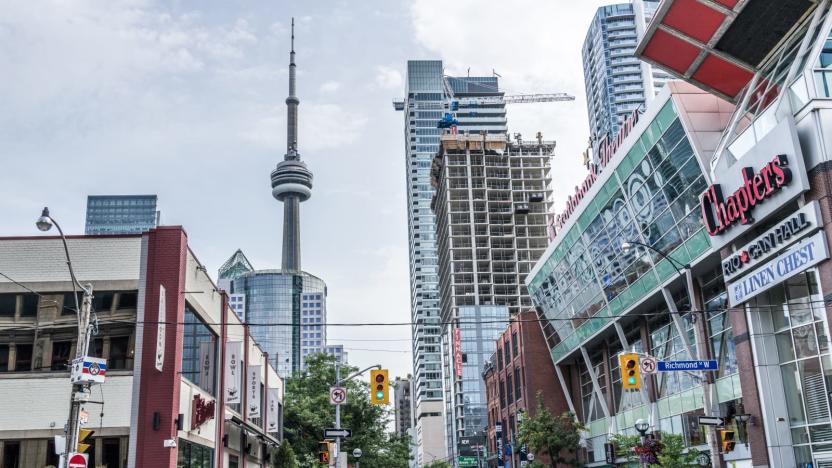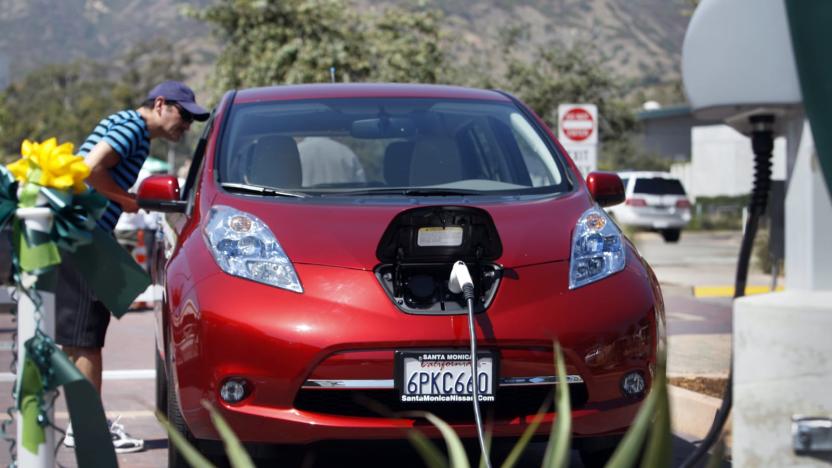subsidy
Latest

France is working on a program to let people lease EVs for €100 per month
France is preparing to launch a new electric vehicle subsidy program that would allow people to lease EVs for €100 a month

FCC says Sprint falsely claimed Lifeline subsidies for 885,000 customers (updated)
The Ajit Pai-era FCC has been determined to crack down on Lifeline program abuse from the outset, and now it's leveling some particularly serious allegations. Regulators have accused Sprint of claiming monthly subsidies in the low-income communications program for 885,000 customers that weren't using it. That represents just shy of 30 percent of Sprint's Lifeline customers, almost 10 percent of the whole Lifeline base and "tens of millions" of dollars in wasted funding, the FCC said.

FCC loses bid to cut tribal broadband subsidies
Things definitely aren't going the FCC's way this week. A federal appeals court has reversed the FCC's attempt to cut broadband subsidies in tribal lands, citing both a lack of supporting evidence as well as a lack of considerations when making the decision. The regulator didn't show how pulling the $25 Lifeline discount would lead to carriers filling the void like it claimed, according to the ruling. It also didn't acknowledge that resellers were leaving the program, and didn't factor in the potential loss of access to internet service or the wireless rollout data related to the services they use.

Court blocks FCC from cutting broadband subsidies in tribal lands
The FCC has hit a snag in its plan to curb broadband subsidies for low-income homes. A DC appeals court has issued a stay order temporarily blocking the regulator from limiting the $25 monthly Lifeline subsidy in tribal lands, arguing that native groups and small carriers are likely to win their case opposing the cuts. The court agreed with plaintiffs that the FCC's move would likely lead to a "major reduction, or outright elimination" of vital communication for many tribal residents, and "substantial, unrecoverable losses" for providers that might lead to them going out of business.

Tesla to cover the cost of Germany's court-ruled subsidy repayments
Some German Tesla owners are facing a surprise €4,000 bill for purchasing their Model S cars, thanks to a confusing ruling by Germany's Federal Office for Economic Affairs and Export Control. In a bid to push EVs and plug-in hybrids in the country, Germany offers a €4,000 subsidy for electric vehicles with a base price under €60,000 (half of the subsidy comes from the government, the other half from the automaker itself).

Ontario kills EV subsidies to reduce gas prices
Last month, Ontario elected a new provincial government; Doug Ford's Conservative Party, which has already begun enacting its key policies. That includes an immediate end to an electric and hydrogen vehicle subsidy, as well as incentive programs for EV chargers. The aim? To gut a cap-and-trade program that was designed to encourage folks to ditch their planet-killing gas guzzlers.

California power companies want $1 billion to build EV chargers
It's expensive to build an electric car charging network, and California utilities want the government's help covering the tab. PG&E, SDG&E and Southern California Edison are requesting roughly $1 billion in funding to build both EV chargers and the power infrastructure needed to support them. Edison is asking for the most. It's asking for $570 million to build public fast charging sites, the foundations for charging medium- and heavy-duty vehicles (including buses) and incentives in both electricity rates and for EV-toting ridesharing drivers.

FCC expands Lifeline to help low-income Americans afford internet
Today the FCC voted 3-2 to approve expanding its Lifeline program that has subsidized phone and prepaid wireless access for low-income Americans since the 80s, so that now it covers internet access too. The $9.25 household subsidy is paid directly to service providers, and now it can be applied to standalone internet access, or bundled voice/data service. There are requirements for the services provided, like a minimum 150GB monthly usage cap, as well as minimums for mobile broadband usage and cellphone voice minutes.

FCC votes to subsidize broadband internet for low-income households
Last month, the Federal Communications Commission announced plans to subsidize broadband internet service for low-income households. Today, the commission voted on the matter, approving the addition of internet subsidies to the Lifeline program that already offers both phone and prepaid wireless. Less than half of homes that make less than $25,000 have internet access, and today's vote offers help and provides steps to oversee the process, too. For example, service providers will no longer verify eligibility. That task will be given to a third-party instead. The vote also set the subsidy rate at $9.25 per month for both internet and phone service. Where does that money come from? Fees paid by service providers that are listed on customers' monthly bills. The FCC is looking to ensure not only the program's efficiency, but cut down on fraud and establish a set budget as well. [Image credit: Pete Marovich/Bloomberg via Getty Images]

Feds to overhaul program that delivers broadband to the poor
While 95 percent of American households earning six figures annually have access to broadband internet, just 48 percent of homes making under $25,000 enjoy the same benefit. Thursday, the Federal Communications Commission announced plans to reduce that internet inequality gap by subsidizing the broadband access for America's poorest families. Specifically, the FCC is looking to revamp its existing Lifeline program, which already provides both phone and prepaid wireless service, to now include broadband as well.

Georgia wants EV owners to pay for saving the planet
Climate change is still a real, looming threat, so you'd think that getting people using electric cars would be a vital project to safeguard the future. Unfortunately, the state of Georgia is so broke that it's not only pulling its electric vehicle subsidies, it's going to kick would-be planet savers while they're down. Vice News details how the state is about to axe its $5,000 tax credit and, even better, add a $200 a year electric vehicle tax to recoup the drop in gasoline tax revenues.

FCC aims to fine five wireless carriers $14 million for Lifeline program violations
Government shutdown or not, the Federal Communications Commission announced a proposal to fine five cellular service providers a total of $14.4 million for violating the rules of its Lifeline phone subsidy program. In case your memory needs to be jogged, Lifeline allows economically disadvantaged people to get subsidized cellphone service through carriers. Assist Wireless, Easy Wireless, Icon Telecom, TracFone Wireless and UTPhone are all in Uncle Sam's crosshairs for allegedly giving multiple subsidized accounts to folks who should have only received one through the program. This development comes after the commission's revelation that 41 percent of last year's subsidies didn't go through the appropriate verification process. The FCC's sanctions don't stop at the multi-million dollar penalty either. If the federal body gets its way, cash collected through duplicate accounts will have to be returned by offending companies. Update: TracFone reached out to us with a response to the FCC's proposal, saying that the commission's dispute with it involves less than $8,000 and fewer than 850 people -- a drop in the 4 million person Lifeline-customer bucket. Hit the break for the firm's full statement.

Engadget Primed: making sense of the US' new phone unlocking policy
Primed goes in-depth on the technobabble you hear on Engadget every day -- we dig deep into each topic's history and how it benefits our lives. You can follow the series here. Looking to suggest a piece of technology for us to break down? Drop us a line at primed *at* engadget *dawt* com. On October 25, 2012, the US librarian of Congress ruled that the act of unlocking your phone was no longer allowed under copyright law. The ruling, which has been severely criticized by consumer advocacy groups and tech enthusiasts across the country, declares that it's a copyright violation if you unlock your phone without the permission of the carrier it's locked to. Why would such an unthreatening action result in heavy fees and possible jail time? After the break, we'll discuss what the ruling means for the future of the mobile industry, how it will impact consumers and if we should worry that our dentist's uncle's third cousin (once removed) is in trouble because he has an unlocked phone.

THQ's new prez stands behind Montreal studio, though 'there may be empty seats'
When THQ announced its Montreal, Canada-based studio in 2009, the plan seemed a bit on the ambitious side. 400 new employees across five years, two big projects – one of which is overseen by ex-Assassin's Creed creative lead Patrice Desilets, the other being a followup to 2011's Homefront – and a brand new campus meant a lot of money needed to be spent, even with a potentially generous tax credit from the Canadian government.And that was long before THQ's recent financial troubles. It's in that context that we asked newly hired president Jason Rubin to address the future of the Montreal location during an E3 interview. "I think the decision needs to be made which projects we can do, what we can afford to do, and stick to it. Even though THQ Montreal's space may be bigger than what we need right now, there's nothing about that space that prevents us from succeeding," Rubin said.We asked Rubin whether THQ could fulfill the planned 400-person contract across five years in its current financial state. "There may be empty seats," he admitted, but he's not worried that those contractual obligations will affect THQ – nor the Montreal location's – long-term survival. "I'm not saying that we wouldn't fulfill our obligations," Rubin told us. "But assuming for a moment that we don't reach whatever our contractual obligations are, there are very specific clauses in the contract that say what would happen. And I've read the contract, I've gone over it, it was one of the things I did before starting. And there's nothing about the contract or our failing under that contract that would cause the company to fail."Rubin stressed that THQ under his leadership remains dedicated to the Montreal studio and its agreement with the government. "I love Montreal. I definitely wanna do right by Montreal, and I definitely wanna fill that studio. But having said that, if we fail to do that for any reason, that's not going to be a cause for failure for the company." He also addressed potential concern that other THQ studios employees could be moved to the Montreal location. "Were I able to pick up and move people without worry about their families, the projects they're working on, and everything else, I would fill that space in a second," Rubin said.Beyond the co-developed Homefront sequel and the unknown Desilets project, it is unclear what else THQ Montreal is working on, if anything.

Carriers accept high iPhone subsidies for now
It's widely believed that US carriers pay a lot for the iPhone. A perfect example is Sprint which signed an estimated US$15 billion deal for the iPhone and won't make money off the handset until 2015. AllThingsD presents several compelling reasons why Sprint and other US wireless carriers are willing to accept such high subsidies for the iPhone. First, the carriers believe the iPhone will help them attract customers and keep them for the long term. Second, the carriers won't stop selling the iPhone now because they want to capitalize on the demand for the LTE iPhone which may arrive as early this year. Third and final, each carrier signed a multiyear agreement with Apple and can't change the subsidy terms until they've rode out the contract.

High carrier subsidies affect iPhone sales in parts of Europe
Apple has a problem with iPhone sales in select European countries, says a recent Wall Street Journal report. The problem isn't with the hardware or even distribution, but pricing and carrier subsidies. In the US, the iPhone is affordable to many people because the carrier foots the bill for the cost of the phone. On most US carriers, the entry-level 16 GB iPhone 4S model sells for US$199 with a two-year customer agreement. Without a contract, the price of the phone balloons to $649. That price difference is shouldered by the carrier which hopes to recoup the up-front loss over the course of the contract. Sprint is an excellent example of the subsidy model in action as the carrier supposedly paid around US$15.5 billion for the iPhone and is not expected to make a profit on the handset until 2015. In Europe, however, many carriers do not subsidize phones and sell them on a prepaid basis. Consequently, the iPhone costs a lot more than its competitors. The Wall Street Journal points to Vodafone Portugal which sells the iPhone 4 for $680, while its low-end Android phones retail for under $200. This price difference undoubtedly influences sales. When given the choice, only 5 percent of customers in cash-strapped Greece are choosing to buy the iPhone, while the rest are selecting less expensive Symbian and Android smartphones. Apple is aware of these prepaid markets and hopes the quality and lower-price of its last generation iPhone models will help it compete. Speaking at a recent investors conference, Tim Cook said, "Everyone in every country wants the best product as it turns out. They're not looking for a cheap version of the best product -- they're looking for the best product." Apple believes the iPhone is the best product and people will pay extra for it.

Sprint launches early upgrade promo, wants you to stay and chat awhile
In an industry where customer churn can be likened to the fearsome troll under the bridge, Sprint has launched a program designed to keep its favored subscribers around for another two years. While not everyone is eligible -- those who've upgraded less than eight months ago, corporate outfits and those in collections need not inquire -- the program lets customers buy their way out of their current commitment and become eligible for a new, subsidized handset. The promotion begins February 12th and is set to run through the 14th of April, where the amount you pay correlates to the time since your last upgrade. So if you're currently pining for the Epic 4G Touch or the iPhone 4S, just give your local Sprint store a call this Sunday. They just may be able to hook you up.

China Unicom offers iPhone 4S free with subsidy, really just wants your commitment
The leaders at China Unicom are placing their bets on the iPhone 4S in a very big way. With a new promotion that begins January 13th, the nation's second largest mobile carrier will offer both the 32GB and 16GB versions of Apple's latest iPhone free on-contract. To score the high-end model, consumers must sign a three-year agreement with a minimum monthly cost of 286 yuan ($45). Alternately, those looking to avoid the long-term commitment may pick up the 16GB version on a two-year contract with a minimum price of 386 yuan ($61) per month. With the obvious price differential, one thing is for certain -- China Unicom definitely wants its customers to stick around.

French President Nicolas Sarkozy wants to create music with a tax on ISPs
Nicolas Sarkozy is worried about the future of his country's music industry, and he's turning to French ISPs for help. Speaking alongside other G8 and G20 delegates at the Forum d'Avignon this weekend, Sarko affirmed his commitment to setting up a "national music center" within France, in the hopes of spurring artistic creativity amid a rather dour industrial climate. Modeled on France's National Cinema Center, the system was first proposed back in September by Minister of Culture Frédéric Mitterrand, and, if launched, would be funded by a tax on ISPs. According to Sarkozy, taxing service providers in the name of protecting French art is only fair game. "Globalization [has allowed] the giants of the Internet to make a lot of money on the French market," Sarkozy explained, echoing familiar Gallic attitudes toward online protectionism. "Good for them, but they do not pay a penny in tax to France." He went on to praise his country's Hadopi copyright law for reducing internet piracy by 35 percent, but stressed that the government must do more to protect what could be a dying French commodity: "The day when there is no more music, the day when there is no longer a cinema, the day when there are no writers, what will your generation search for on the internet?" Other things, probably.

Rogers Canada offers 'early upgrade' for your horribly outdated phone
Long term relationships can be hard. After a year or two, it's easy to lose interest -- but a contract's a contract, right? Not in Canada, apparently. Wireless carrier Rogers is offering a get out of jail early card, letting you get some new hardware before the end of your contract with its new "early upgrade" offer. But if you want, say, the Xperia Play pictured above, ditching your antiquated handset will cost you, naturally. The service provider has a tiered pricing plan, charging a different level depending on the device and the amount of months that you've got left -- something of an early termination fee for those who don't mind sticking with the carrier. If math isn't your thing, Rogers recommends you pop by one of its retail locations to help you figure out just how much it'll run you. In the meantime, try to avoid hurling the thing out a window in disgust, okay?












